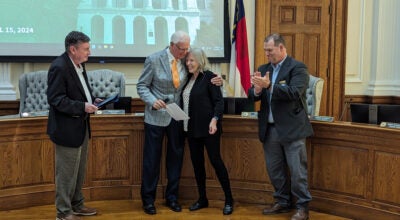Gas prices lead some to change driving habits
Published 12:00 am Friday, April 8, 2011
By Hugh Fisher
hfisher@salisburypost.com
SALISBURY — From organizing online boycotts to buying different cars, people are trying all sorts of ways to save money on gasoline.
Thursday, a drive around Rowan County found prices for regular unleaded hovering between $3.59 to $3.74. The highest observed prices were at stations near Interstate 85 in Kannapolis. The lowest was at Circle K in Granite Quarry.
Why are prices so high to begin with? Everyone has an opinion.
Donna Girouard of Lexington commutes to Salisbury each day. She says the answer is simply speculation.
“People hear some report, some rumor, of something that might make prices go up,” said Girouard, an English instructor at Livingstone College.
Many blame the military action in Libya for higher prices at the pump.
But a recent Washington Post report, “Five Myths About Gas Prices” by Robert Rapier, says less than 50,000 barrels of oil a day came from Libya last year.
That’s less than one percent of the 9.2 million barrels per day the U.S. imported in 2010.
Rapier said speculators have driven oil prices higher on fears that protests might spread to countries like Saudi Arabia that produce much more oil.
On the other hand, oil futures began to trade lower this week because of fears that high prices might stop economic growth in the U.S. and elsewhere.
Many have tried to switch to more fuel-efficient cars, such as hybrids that combine electric motors with smaller gas engines.
But good luck finding a hybrid at some local dealers.
Gary Sloan, a new car sales manager at Cloninger Toyota of Salisbury, said the recent earthquake in Japan had closed plants that produce the popular Prius hybrid and other models.
Thursday, there was only one new Prius and four pre-owned ones on the lot, Sloan said.
“We have many deals working,” Sloan said. He claimed the supply stoppage had many people shopping for a hybrid.
Other hybrid models, including the Toyota Camry and Highlander, had also been affected.
Those cars get between 22 and 34 miles per gallon, Sloan said, depending on the type of driving and the model.
The Prius, meanwhile, is rated up to 51 miles per gallon city.
“People are calling and stopping by every day” trying to find one, he said.
Still, not everyone has the ability to choose a more fuel-efficient vehicle.
Gary Lankford and wife Darlene, who live on High Rock Lake, drive a 2001 Ford Explorer.
Thursday afternoon, they stopped at the Rushco BP on Jake Alexander Boulevard to fill up for the week.
“We just put $74 in gas in this car,” Lankford said.
A necessity, he said, even though they have a fixed income.
Darlene suffers from diabetes, and Gary had a heart transplant a year ago.
When gas goes up, they stop eating out and cut out any unnecessary trips.
Still, they feel the pain of higher gas prices.
“If there’s one thing hurts the economy and causes it to go down, it will be gas prices,” Lankford said.
He said price hikes hurt the working people who often have to commute long distances to work.
Those same people, he said, can’t afford new, fuel-efficient cars.
“I think the prices are driven by greed from the gasoline companies,” Gary said. “And it has a big impact on what people consume.”
Many people interviewed by the Post said they wanted to see the government tap into oil reserves to bring prices down.
Rick Joplin, a small business owner, stopped to top off his tank with Crystal Beckett.
The two said getting oil from the reserve would help people like them.
“Or we’re going to be back at $4 or $5 a gallon before it’s over with,” Joplin said.
But economists say tapping the reserves doesn’t make sense.
As Rapier and others have noted, the Strategic Petroleum Reserve is intended to supply the nation’s needs in case of a major catastrophe.
Oil used out of the reserve now would have to be replaced later at higher prices.
Others suggested beginning to drill more oil from U.S. coastlines and land preserves.
Experts say that new wells from those sources could take as much as a decade to start supplying oil to the market, given current regulations.
Most everyone interviewed said they’re trying to cut back their budgets as much as they can.
But they aren’t expecting things to change anytime soon.
Lankford said he doesn’t think the government will do anything about gas prices.
“The Bush administration didn’t, and so far the Obama administration hasn’t, either,” Lankford said.
Girouard said she’s torn on how to respond to the high prices.
“As a Libertarian, I don’t like to see a lot of government controls,” she said.
She said she would like to see boycotts work, but aside from that, she and her husband try to conserve fuel.
Like many drivers, she doesn’t mind driving a little bit out of her way to buy gas that’s a few cents cheaper.
“As Americans and consumers, that’s probably our strongest measure,” Girouard said.
Contact Hugh Fisher via the editor’s desk at 704-797-4244.




